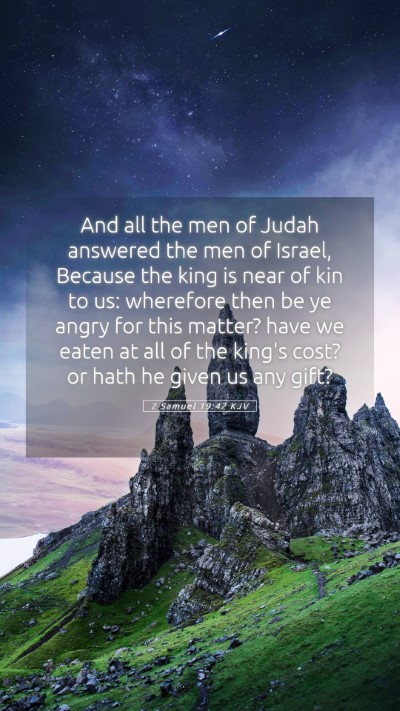Understanding 2 Samuel 19:42: A Comprehensive Commentary
Bible Verse: 2 Samuel 19:42
This verse captures a critical moment in the narrative of David's reign, highlighting the complexities of loyalty, familial ties, and tribal dynamics within Israel.
Summary of the Verse
In this passage, the interaction between the different tribes of Israel and David is reflected. The men of Judah, David's own tribe, assert their claim and support for David’s kingship, contrasting with other tribes—especially the northern tribes—who feel slighted for not being equally involved in bringing the king back after Absalom's rebellion. This verse unveils the underlying tensions and the pride of tribal affiliations in the kingdom of Israel.
Bible Verse Meaning
The meanings derived from this verse can be illuminated through the insights of renowned commentators:
- Matthew Henry: Henry emphasizes the theme of tribal loyalty and the implications of David's acknowledgment of Judah's prominent role. He points out that there is a sense of pride among the tribes, especially in how they each view their contributions to the monarchy. This division underscores the importance of unity and the distractions that pride brings to communal harmony.
- Albert Barnes: Barnes comments on the contention and jealousy that arose between the tribes following David’s return. He suggests that the differing perspectives and grievances among the tribes influenced the political fabric of Israel, indicating that the loyalties were often divided along tribal lines, which played a crucial role in the events that unfolded later in Israel’s history.
- Adam Clarke: Clarke elaborates on the interactions between David and the tribes, underscoring the dynamics of leadership and the responsibilities of rulers to maintain peace and unity among the diverse factions within their realm. He also notes the significance of public perception in governing and the challenges that arise from miscommunication and assumption among the tribes.
Key Themes and Insights
This verse encapsulates several key themes relevant to Bible study:
- Loyalty and Division: The verse illustrates the duality of loyalty, showcasing how devotion to David is mirrored by tribal pride. Understanding these dynamics is crucial for interpreting the political and social landscape of ancient Israel.
- Leadership Challenges: David's kingship highlights the struggles leaders face in uniting their followers, which is pertinent even in contemporary discussions about leadership in communities and organizations.
- Importance of Communication: The interactions among the tribes serve as a reminder of the necessity of clear communication and understanding in any group setting, especially those divided by varying interests and sentiments.
Application of the Verse
In applying the insights from this verse to daily life, consider the following:
- Community Involvement: Just as the tribes had their expectations, today’s communities thrive on inclusivity and active participation from all members.
- Resolving Conflicts: The verse encourages the examination of grievances in our lives, advocating for open dialogues and attempts to reconcile differing perspectives within any team or group.
- Understanding Tribal Dynamics: Acknowledging the implicit biases and loyalties that can affect interactions in organizations can help in fostering a more cohesive environment.
Cross References
This verse connects with several important passages that expand on its themes:
- 2 Samuel 19:10: Discusses Absalom's death and the impact it has on the loyalty of the tribes.
- 1 Kings 12:16: Explores continued tribal divisions and the fallout of David's royal lineage.
- Psalm 133:1: Reflects on the beauty of unity among brethren, tying back to the themes of division from 2 Samuel 19:42.
Conclusion
Engaging with 2 Samuel 19:42 provides valuable insights into the political and social contexts of biblical narratives. The discussions prompted by this verse offer essential Bible study insights for understanding leadership, loyalty, and group dynamics—pertinent not only in biblical times but still relevant today. Through the exploration of this verse, one can better grasp the intricacies of maintaining harmony within diverse communities and the responsibilities of leadership.


